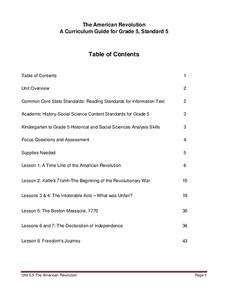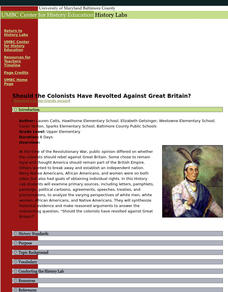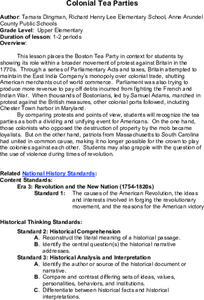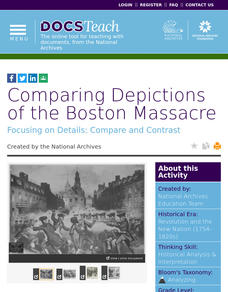Carolina K-12
Causes of the American Revolution
Beginning with the experience of hearing that lockers in school will be taxed, through analysis of political cartoons and informational text, and culminating in a debate between loyalists and patriots, your class members will engage in a...
Carolina K-12
On the Road to Revolution: Creating a Living Timeline
Divided into nine topic groups, from the Proclamation of 1763 to the Battles of Lexington and Concord, your young historians research significant events on the road to the American Revolution, then create a two- to three-minute sketch...
Los Angeles Unified School District
Why Is the Declaration of Independence Important?
Fair or unfair? To begin a study of the American Revolution, class members review the treatment of the people of the American Colonies by the King of England and decide which were fair and which were unfair. Class members then annotate a...
Curated OER
Unit 1: Building Historical Background Knowledge: The Road to Revolution 1754–1776
What were the conditions that led to the American Revolution? What are the conditions that lead to revolution in other times and places? Class members examine primary source materials and use evidence drawn from these documents to craft...
California State University
The American Revolution
Invite your class on a ride through the American Revolution. Young historians travel through time as they explore the events that led to the foundation of the United States of America. Over the course of eight lessons, this unit provides...
Roy Rosenzweig Center for History and New Media
The Boston Massacre: You Be the Judge!
The importance of considering multiple perspectives of the same event is the big idea in this exercise that focuses on the Boston Massacre. Class groups examine photos of four depictions of the massacre, an English and an American...
Curated OER
Patriots and Loyalists
Young scholars examine portraits by John Singleton Copley and discuss how the subject's appearance communicates important information about his or her life. They write a diary entry from the point of view of a portrait subject.
Curated OER
Tension Between Conflict and Compromise
Learners prepare for and participate in a debate and mock trial regarding laws broken during the Boston Tea Party. Several primary documents and a homework chart are included.
University of North Carolina
American Revolution: Events Leading to War
After learning about the growing revolutionary sentiment among colonists, class members work in small groups or pairs to design a political cartoon.
K20 LEARN
Give Me Liberty or Give Me Death: The Journey to Revolution
The words of "Common Sense" and Patrick Henry's "Give me liberty or give me death!" speech ring throughout history. Scholars explore the nuances of each patriot's argument using excerpts from the famous pamphlet and speech and a recorded...
Simon & Schuster
A Teacher's Guide to 1776 by David McCullough
David McCullough's Pulitzer Prize-winning novel, 1776, is the focus of a 28-page teacher's guide. The guide includes pre-reading questions, background information about key British and American figures, and chapter-by-chapter lessons.
Center for History Education
Should the Colonists Have Revolted Against Great Britain?
Should the Americans have taken the plunge and revolted against Great Britain? Using documents, including the famed Common Sense and a Loyalist response, pupils conduct a lengthy investigation of the question. The interesting resource...
Center for History Education
Who Fired the Shot Heard Round the World?
Take a closer look. Young academics become detectives in an engaging lesson on the American Revolution. Scholars work in groups to analyze documents to uncover whether the American colonists or British soldiers fired the first shot at...
Center for History Education
The Non-Importation Movement
Boycott for free trade! An eye-opening lesson explores the non-importation movement created by American colonists in response to the Stamp and Sugar Acts. Scholars specifically look at the impact the boycott had on colonial women who had...
Center for History Education
Who Burned the Peggy Stewart?
Not all Patriots were on the same page against the British before the Revolutionary War. While some wanted to use peaceful means, such as debate and petition, others used violence, such as burning ships carrying British tea. Using...
Center for History Education
Colonial Tea Parties
Most people know of the Boston Tea Party, but it was only one of similar protests throughout the colonies. Using a case study from Maryland, learners explore primary sources, including images and newspaper accounts of similar tea...
Museum of the American Revolution
Object Observation: Purpose on a Powder Horn?
Young archeologists discover the significance of ordinary objects from the past in an interesting lesson on artifact analysis. The activity focuses on examining the image of a powder horn from the Revolutionary War to understand what it...
Museum of the American Revolution
People of the Revolution
It's nothing new—America has always been a melting pot of cultures. The resource explores the diversity of individuals living in the American colonies during the Revolutionary War. Scholars examine artifacts and primary sources to...
Museum of the American Revolution
Dissecting the Declaration
Delve into the past to understand the issues that led to the Declaration of Independence. Academics read excerpts from the Declaration of Independence and take a virtual tour of the American Revolution Museum. The resource explains how...
Museum of the American Revolution
Through Their Eyes: Major Causes and Events of the American Revolution
Looking for an efficient way to explore the causes and results of the American Revolution? The American Revolution Museum offers a seven-lesson series to hit the highlights of this turning point, using primary sources and activities such...
Museum of the American Revolution
Image Analysis: In Their Own Words
Images often convey more than words. Scholars examine political cartoons from the American Revolution to understand how images have the ability to express political ideas. Academics participate in group discussion, complete a worksheet,...
Museum of the American Revolution
The Ongoing Revolution
America: a nation that continues to change. Budding historians analyze primary sources to understand the key ideas of the American Revolution and how the country has changed over time. Scholars read text from the Declaration of...
DocsTeach
Comparing Depictions of the Boston Massacre
Academics compare images of the Boston Massacre to understand differing opinions of the event. Scholars view multiple images, participate in group discussion, and complete a series of written prompts. Young historians gain an...
DocsTeach
To Sign or Not to Sign
To sign or not to sign, that is the question. Scholars review the Declaration of Independence and discuss the Framers' decisions for signing the document. The activity uses primary text, a worksheet, and group discussion to help...

























